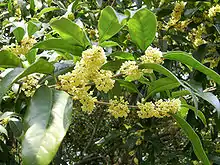木須
Chinese
| tree; wood | phonetic | ||
|---|---|---|---|
| trad. (木須) | 木 | 須 | |
| simp. (木须) | 木 | 须 | |
Etymology
From the flower of the plant 木樨 (mùxī, “sweet osmanthus”), due to a similar appearance.
Qing-dynasty official and writer Liang Gongchen recorded the following in his Scribbled Notes on the Gardens of the North and East, 3:
- 北方店中以雞子炒肉,名木樨肉,蓋取其有碎黃色也。 [Classical Chinese, trad.][▼ expand/hide]
- Běifāng diàn zhōng yǐ jīzǐ chǎo ròu, míng mùxī ròu, gài qǔ qí yǒu suì huáng sè yě. [Pinyin]
- In shops of northern China, people stir-fry meat with eggs and call the dish “muxi pork”, because of its mottled yellow appearance.
北方店中以鸡子炒肉,名木樨肉,盖取其有碎黄色也。 [Classical Chinese, simp.]
The pronunciation is due to assimilation of vowel roundness.
Pronunciation
Synonyms
- 木樨 (mùxī)
Derived terms
|
Descendants
- English: moo shu
This article is issued from Wiktionary. The text is licensed under Creative Commons - Attribution - Sharealike. Additional terms may apply for the media files.
